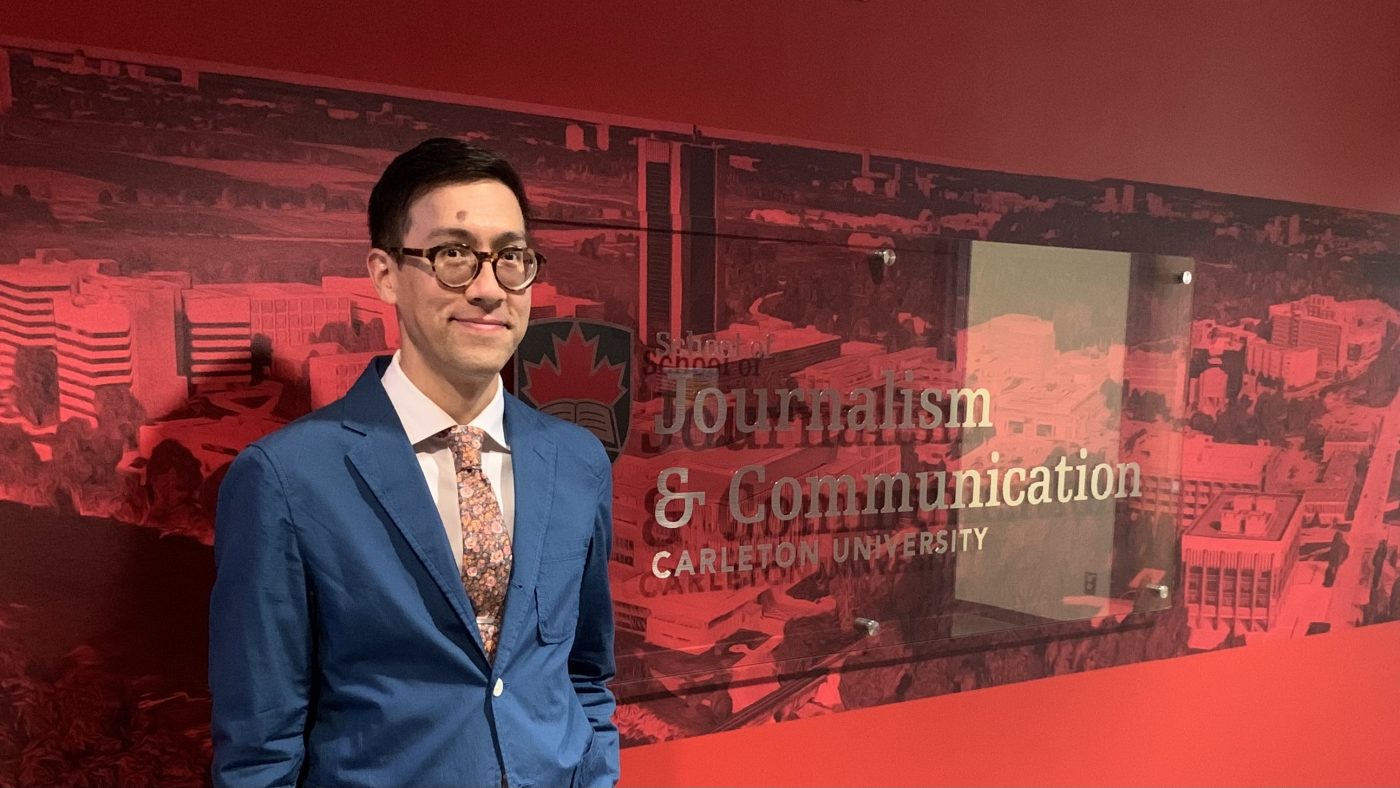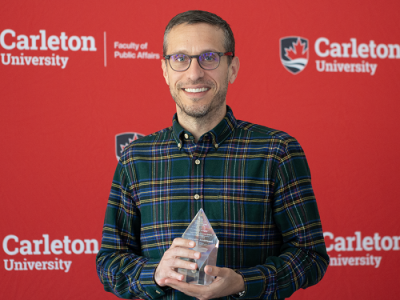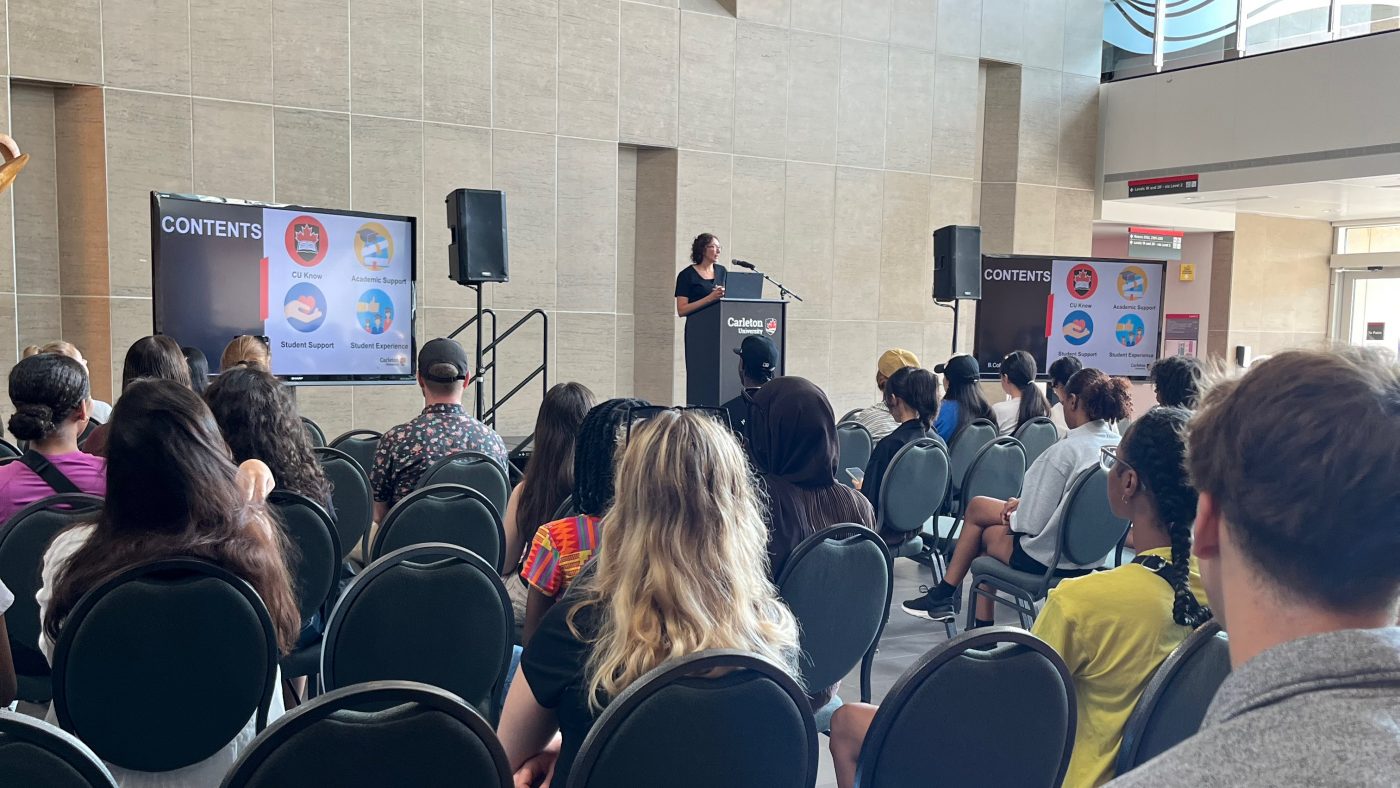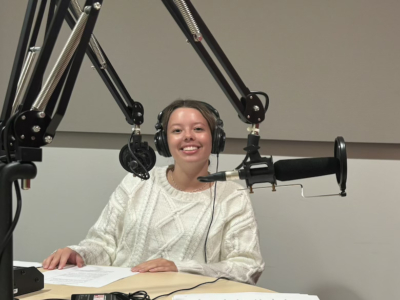As summer draws to a close, the Communication and Media Studies (COMS) program prepares to welcome its new cohort of first-year students to campus. Approximately 150 students from around the world will arrive to Ottawa at the start of September to begin their degrees in what has long been one of Carleton’s most popular undergraduate programs.
“There’s no problem facing the world that will be solved without communication,” says program head Dr. Benjamin Woo. “COMS students intuitively understand the power of media. Our program prepares them to be critical, informed, and effective users of media in their professional lives and as citizens.”

Benjamin Woo welcomes new COMS students to the School of Journalism and Communication. Prof. Woo is associate director of the School and program head for Communication and Media Studies.
Many students who enter communication and media studies are interested to pursue careers in strategic communication, public relations, and other areas of professional communication, Woo says. The program prepares them for these career paths but also introduces them to many other career opportunities by sparking and nourishing their curiosity about the central role of media and communication in all aspects of everyday life, from how we shop to how we bank, how we build communities, find a job, and fall in love.
Getting Started in Communication and Media Studies
All COMS students must complete two 0.5-credit courses in their first year. In the fall semester, students will register for COMS 1001: Foundations in Communication and Media Studies. They’ll extend their learning in this course during the winter semester, in COMS 1002: Current Issues in Communication and Media. First year students are reminded to register in both courses, which are taught by Dr. Vincent Andrisani, a recent winner of a Faculty of Public Affairs teaching excellence award.
“These foundational courses are designed to introduce students to communication and media studies,” Andrisani says. “We ground students in key terms, concepts and themes that define our discipline and field, and then use them to understand some of today’s most pressing social issues: climate change, public health, cancel culture, and diversity in media, among others.”

Vincent Andrisani receives a 2023 Faculty of Public Affairs Teaching Excellence Award. Prof. Andrisani teaches COMS 1001 and 1002.
Andrisani says one of the biggest challenges first year students encounter is the need to be independent and self-motivated. He strongly recommends that students develop good habits and routines to keep on top of their weekly readings, lessons, and assignments, and that they build a support network and community with other students are also in the same position.
“My message to students is this: you are not alone. You will soon meet others who are in the very same position as you are. Lean on and support each other and know that we have a strong support system in the COMS program to guide you along when you need help. Get to know your classmates and professors. If you’re unsure about anything, just ask!”
Building Skills for Academic Success
One of the courses that will help students learn those fundamental skills for success is the communication and media studies program’s first year seminar, FYSM 1217: Reading and Writing for Communication Studies. The course has been developed and led over the past few years by doctoral student Jo Farrall. Where Andrisani’s courses are required of all COMS students and have large enrolments of several hundred students per section, Farrall’s course is an elective but one that the program strongly recommends. Enrolment is always capped at no more than 30 students.
“My main goals with this seminar are twofold,” Farrall says. “First, to demystify university life by helping students develop effective strategies for reading across a wide range of academic genres. Students build core skills in critical thinking, they learn how to navigate the library and use its learning resources, how to identify and critically assess different kinds of information sources, and how to build and deliver an effective argument, whether orally or in writing.”
Farrall notes that these skills are not just important to learning how to adjust to the demands of first year but are essential to success across all years of a student’s program.
“Academic work is complex and challenging,” Farrall says. “I help students make sense of this complexity, to build their confidence in reading academic research, to identify the arguments of the authors they read, to understand what distinguishes an argument from an opinion, and to develop and make their own evidence-informed arguments.”
Students who complete the first-year seminar in communication typically achieve higher grades and finish their degrees more quickly. Farrall attributes this outcome to the unique approach of the seminar: “First year is exciting and scary. Many new students fear that they will simply disappear into the crowd. The small size of the seminar ensures that they get to know their peers, have dynamic and exciting conversations, learn through hands-on activities, and that they get extensive feedback and dedicated one-on-one time with their instructor.”
The 2023–24 academic year also marks the introduction of a new first year elective course in the COMS program. COMS 1003: Digital Skills in Communication and Media Studies will be delivered this year by Dr. Sandra Robinson, a professor with expertise in digital media, social media, and algorithmic culture. Robinson has won multiple teaching excellence awards and is the COMS program’s teaching mentor; in this role, she works with faculty on the continual development of their teaching skills.
“This course offers students opportunities to build basic digital skills for success both at university and in their careers, from how to format documents or work with spreadsheets, to more advanced capabilities required to work collaboratively with others,” she says.
As with Farrall’s first year seminar, Robinson’s digital skills course helps students establish a foundation for success in all years of their program. “The main goal here is to build student comfort and confidence for using different systems and apps to facilitate their research, writing, presentations, and the production of multimedia content for class assignments.”
As an internationally recognized expert in the study of algorithms, privacy and surveillance, Robinson will also ensure that students acquire a deep understanding of key issues in digital technology today.
“It’s important that students not only learn how new technologies work and can support their learning, but also that they become well versed in such issues as cyber-safety and security, data privacy, data and databases, emerging technologies and artificial intelligence, and multiplatform social network technology and how to use this technology responsibly.”
COMS 1003 launches for the first time in September 2023 but has been in development for several years. “Media technologies are always changing and so are we!” Robinson says. “Our hope is that students will be able to dig a bit deeper into digital technology and build advanced skills to help them design, conduct, apply and critique research as they move through our program.”
Getting Involved Outside the Classroom

Miranda Brady addresses new COMS students on Academic Orientation Day. Prof. Brady is the Undergraduate Supervisor for COMS.
The 2023–24 school year begins with Academic Orientation Day on September 5. In addition to this cluster of exciting first year courses, new students are encouraged to become active members of the COMS community by participating in all aspects of student life. Visit us on the 4th floor of Richcraft Hall, drop by our Readers Digest Resource Centre where students have both quiet and group study spaces, and join the Carleton Communications Society to participate in all kinds of professional and social activities and events.
And be sure to RSVP for the annual Attallah Lecture. This year’s lecture, “Between Legacy and Streaming: Mainstreaming Gays in the 21st Century,” examines the changing contexts of LGBTQ media and will be delivered by Dr. Eve Ng, Associate Professor at Ohio University and author of the forthcoming Mainstreaming Gays: Critical Convergences of Queer Media, Fan Cultures, and Commercial Television. The 14th annual Attallah Lecture will be held on Thursday, September 28.
Banner by Tyler Callahan on Unsplash
Tuesday, September 5, 2023 in Communication News
Share: Twitter, Facebook



